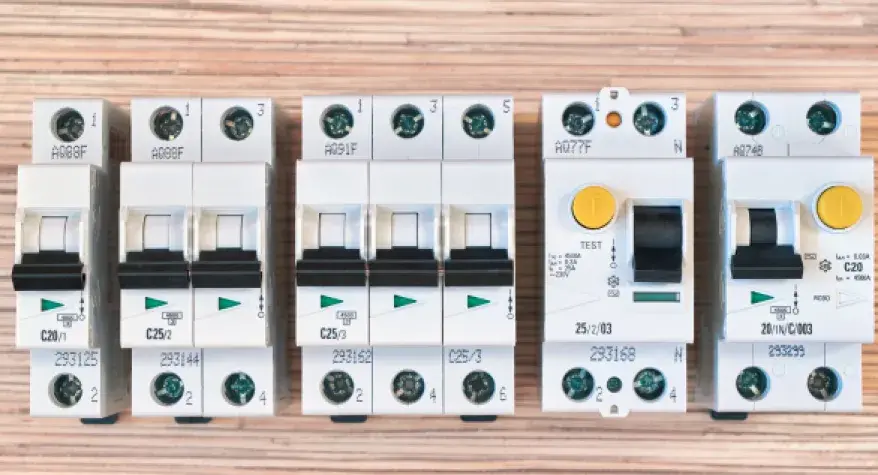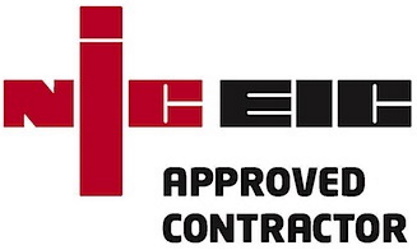Electrical safety is a crucial consideration in homes, workplaces, and public spaces. Two vital components that protect against electrical hazards are Residual Current Devices (RCDs) and Residual Current Breaker with Overcurrent (RCBO). These devices are designed to prevent electric shocks, reduce the risk of fires, and safeguard people and property from electrical malfunctions.
This article will provide a clear understanding of RCD and RCBO protection, including how they work, where they are used, and why they are essential for modern electrical installations.
A Guide to RCD and RCBO Protection - Gault Electrical Solutions, Alloa
What is an RCD?
A Residual Current Device (RCD) is a life-saving safety device designed to prevent electric shocks by quickly disconnecting a circuit when it detects an imbalance in the current flow. It constantly monitors the current flowing through live and neutral wires, and if it senses a difference—indicating that some current is escaping, possibly through a person or due to faulty wiring—it will trip the circuit, cutting off power.
How it works: In normal conditions, the current flowing into a device through the live wire should equal the current returning through the neutral wire. An RCD detects any difference (as small as 30 milliamps), which could indicate a leakage current caused by contact with water or a person touching a live wire. The RCD disconnects the power in milliseconds, preventing severe injury or death.
Types of RCDs:
- Fixed RCDs: Installed in the consumer unit (fuse box) to provide protection for individual or multiple circuits.
- Socket RCDs: Built into power sockets, protecting only the device plugged into that socket.
- Portable RCDs: Plug-in devices that offer temporary protection for electrical equipment used outdoors or in areas without RCD-protected circuits.
What is an RCBO?
A Residual Current Breaker with Overcurrent (RCBO) combines the functions of an RCD with an additional feature: overcurrent protection. It not only safeguards against residual currents (as an RCD does) but also provides protection from overloads and short circuits, which can cause fires or damage electrical equipment.
How it works: An RCBO continuously monitors both residual current (like an RCD) and current overloads or short circuits (like a circuit breaker). If either a leakage or an overcurrent occurs, the RCBO disconnects the circuit, providing comprehensive protection.
Overload and short circuit protection: Unlike an RCD, which only protects against electric shocks, an RCBO also senses if too much current is flowing through the circuit, such as when too many appliances are drawing power, or a fault in wiring causes a short. This makes RCBOs more versatile and often preferred in modern installations where individual circuits need full protection.
RCD vs. RCBO: Key Differences
While both RCDs and RCBOs are critical for electrical safety, they serve slightly different purposes. Here’s a quick comparison:
| Feature | RCD | RCBO |
| Primary Function | Primary Function Protects against electric shock (residual current) Protects against electric shock, overloads, and short circuits | Primary Function Protects against electric shock (residual current) Protects against electric shock, overloads, and short circuits |
| Protection Type | Residual current (earth leakage) only | Residual current + overcurrent protection |
| Where Used | Whole circuit protection (via consumer unit) or individual socket Individual circuit protection (via consumer unit) | Individual circuit protection (via consumer unit) |
| Cost | Generally less expensive | Generally less expensive More expensive due to added functionality |
| Ideal Application | Areas where only shock protection is needed Circuits where both shock and overcurrent protection are required | Circuits where both shock and overcurrent protection are required |
When and Where to Use RCDs and RCBOs
RCDs are typically used to provide protection for entire circuits, such as all the lighting or power sockets in your Alloa home. They are also required in areas with higher risk, such as bathrooms, kitchens, and outdoor circuits, where the risk of electric shock is higher.
RCBOs are ideal for use on individual circuits that require both residual current and overcurrent protection. For instance, a kitchen with multiple high-power appliances or an outdoor shed with power tools might benefit from RCBO protection.
Many modern homes and commercial buildings in Alloa opt for RCBOs for each circuit in the consumer unit, as they offer comprehensive protection without the need for multiple devices.
Why Are RCDs and RCBOs Important?
Electrical hazards can lead to fatal electric shocks, fires, or damage to expensive equipment. RCDs and RCBOs play a crucial role in mitigating these risks. Here’s why they are essential:
Preventing Electric Shocks: RCDs and RCBOs are designed to cut off the electricity supply within milliseconds if they detect a problem, reducing the risk of serious injury or death from electric shock.
Preventing Electrical Fires: Overloads and short circuits are common causes of electrical fires. RCBOs can detect these issues and disconnect the power before the situation escalates into a fire hazard.
Complying with Safety Standards: Within the UK, electrical safety regulations mandate the use of RCDs or RCBOs for new installations and renovations. This ensures that homes and workplaces meet modern safety standards.
Installation and Maintenance
RCDs and RCBOs should always be installed by a qualified electrician to ensure they meet electrical codes and standards. The installation process involves connecting the device to your home’s electrical system via the consumer unit (fuse box).
Once installed, regular testing is important to ensure they function correctly. Most RCDs and RCBOs have a test button, typically marked with a "T," which should be pressed every six months to simulate a fault and ensure the device trips as expected.
If the device does not trip during testing, or if it trips repeatedly without an apparent reason, you should contact an electrician to assess the system.
RCD And RCBO Protection in Alloa
RCD and RCBO protection are fundamental to ensuring electrical safety in any environment. Whether you're a homeowner, business owner, or working on a construction site, understanding the importance of these devices—and ensuring they are properly installed—can save lives and prevent property damage.
When deciding between an RCD and an RCBO, consider the specific needs of your circuits and the level of protection required. For comprehensive safety, RCBOs offer the most complete protection, though RCDs are a cost-effective and vital tool for minimizing the risk of electric shock.
If you would like to learn more about RCD and RCBO protection, contact Gault Electrical Solutions - your local electrician in Alloa.



